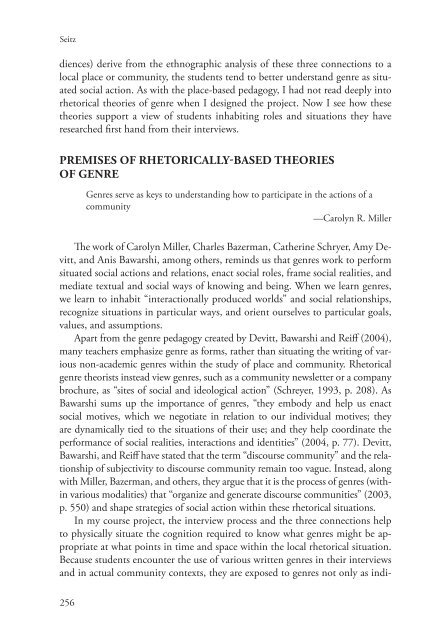Critical Expressivism- Theory and Practice in the Composition Classroom, 2014a
Critical Expressivism- Theory and Practice in the Composition Classroom, 2014a
Critical Expressivism- Theory and Practice in the Composition Classroom, 2014a
You also want an ePaper? Increase the reach of your titles
YUMPU automatically turns print PDFs into web optimized ePapers that Google loves.
Seitz<br />
diences) derive from <strong>the</strong> ethnographic analysis of <strong>the</strong>se three connections to a<br />
local place or community, <strong>the</strong> students tend to better underst<strong>and</strong> genre as situated<br />
social action. As with <strong>the</strong> place-based pedagogy, I had not read deeply <strong>in</strong>to<br />
rhetorical <strong>the</strong>ories of genre when I designed <strong>the</strong> project. Now I see how <strong>the</strong>se<br />
<strong>the</strong>ories support a view of students <strong>in</strong>habit<strong>in</strong>g roles <strong>and</strong> situations <strong>the</strong>y have<br />
researched first h<strong>and</strong> from <strong>the</strong>ir <strong>in</strong>terviews.<br />
PREMISES OF RHETORICALLY-BASED THEORIES<br />
OF GENRE<br />
Genres serve as keys to underst<strong>and</strong><strong>in</strong>g how to participate <strong>in</strong> <strong>the</strong> actions of a<br />
community<br />
—Carolyn R. Miller<br />
The work of Carolyn Miller, Charles Bazerman, Ca<strong>the</strong>r<strong>in</strong>e Schryer, Amy Devitt,<br />
<strong>and</strong> Anis Bawarshi, among o<strong>the</strong>rs, rem<strong>in</strong>ds us that genres work to perform<br />
situated social actions <strong>and</strong> relations, enact social roles, frame social realities, <strong>and</strong><br />
mediate textual <strong>and</strong> social ways of know<strong>in</strong>g <strong>and</strong> be<strong>in</strong>g. When we learn genres,<br />
we learn to <strong>in</strong>habit “<strong>in</strong>teractionally produced worlds” <strong>and</strong> social relationships,<br />
recognize situations <strong>in</strong> particular ways, <strong>and</strong> orient ourselves to particular goals,<br />
values, <strong>and</strong> assumptions.<br />
Apart from <strong>the</strong> genre pedagogy created by Devitt, Bawarshi <strong>and</strong> Reiff (2004),<br />
many teachers emphasize genre as forms, ra<strong>the</strong>r than situat<strong>in</strong>g <strong>the</strong> writ<strong>in</strong>g of various<br />
non-academic genres with<strong>in</strong> <strong>the</strong> study of place <strong>and</strong> community. Rhetorical<br />
genre <strong>the</strong>orists <strong>in</strong>stead view genres, such as a community newsletter or a company<br />
brochure, as “sites of social <strong>and</strong> ideological action” (Schreyer, 1993, p. 208). As<br />
Bawarshi sums up <strong>the</strong> importance of genres, “<strong>the</strong>y embody <strong>and</strong> help us enact<br />
social motives, which we negotiate <strong>in</strong> relation to our <strong>in</strong>dividual motives; <strong>the</strong>y<br />
are dynamically tied to <strong>the</strong> situations of <strong>the</strong>ir use; <strong>and</strong> <strong>the</strong>y help coord<strong>in</strong>ate <strong>the</strong><br />
performance of social realities, <strong>in</strong>teractions <strong>and</strong> identities” (2004, p. 77). Devitt,<br />
Bawarshi, <strong>and</strong> Reiff have stated that <strong>the</strong> term “discourse community” <strong>and</strong> <strong>the</strong> relationship<br />
of subjectivity to discourse community rema<strong>in</strong> too vague. Instead, along<br />
with Miller, Bazerman, <strong>and</strong> o<strong>the</strong>rs, <strong>the</strong>y argue that it is <strong>the</strong> process of genres (with<strong>in</strong><br />
various modalities) that “organize <strong>and</strong> generate discourse communities” (2003,<br />
p. 550) <strong>and</strong> shape strategies of social action with<strong>in</strong> <strong>the</strong>se rhetorical situations.<br />
In my course project, <strong>the</strong> <strong>in</strong>terview process <strong>and</strong> <strong>the</strong> three connections help<br />
to physically situate <strong>the</strong> cognition required to know what genres might be appropriate<br />
at what po<strong>in</strong>ts <strong>in</strong> time <strong>and</strong> space with<strong>in</strong> <strong>the</strong> local rhetorical situation.<br />
Because students encounter <strong>the</strong> use of various written genres <strong>in</strong> <strong>the</strong>ir <strong>in</strong>terviews<br />
<strong>and</strong> <strong>in</strong> actual community contexts, <strong>the</strong>y are exposed to genres not only as <strong>in</strong>di-<br />
256


















